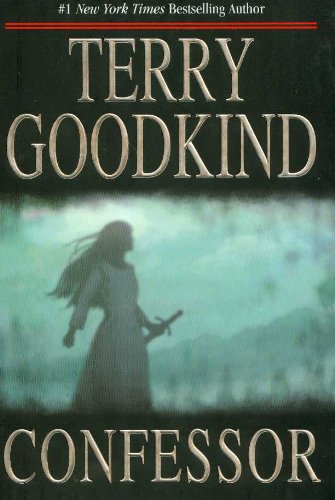
 That’s that, then. The Sword of Truth series is officially over, marking, what, the second open-ended series in my adult life to be completed by its author? (The only other one I can think of is King’s Dark Tower series, though it technically predates my adult life.) The final book, Confessor, very nearly drew me in. Despite the inevitable lecturing on the nature of good and evil as they relate to objectivism, there were some really solid moments. I’m thinking especially of the climactic rugby[1] game in the middle of the book and the events that followed after. I know that sounds like a ridiculous (if not outright parodic) thing to say, but I’m sincere on this point. There were 5 or 10 chapters of non-stop action that was probably as affecting as anything I’ve seen Goodkind write; my pulse was up, I was excited to see the outcome of the events (not just the game), I basically couldn’t put the book down. So, hooray for that.
That’s that, then. The Sword of Truth series is officially over, marking, what, the second open-ended series in my adult life to be completed by its author? (The only other one I can think of is King’s Dark Tower series, though it technically predates my adult life.) The final book, Confessor, very nearly drew me in. Despite the inevitable lecturing on the nature of good and evil as they relate to objectivism, there were some really solid moments. I’m thinking especially of the climactic rugby[1] game in the middle of the book and the events that followed after. I know that sounds like a ridiculous (if not outright parodic) thing to say, but I’m sincere on this point. There were 5 or 10 chapters of non-stop action that was probably as affecting as anything I’ve seen Goodkind write; my pulse was up, I was excited to see the outcome of the events (not just the game), I basically couldn’t put the book down. So, hooray for that.
My complaints, alas, outweigh that moment. I mean, I’ve accepted that objectivist screeds are an inevitable side-effect of the series, but there’s more to it than that in this book. It’s that the first screed was performed between two of the good guys, and since the good guys are all on the side of objectivism, it was required that one of them act angrily out-of-character so that the other could calm him down with the clear truth of things. It’s that a later one was performed by a (let’s say) 10 year-old girl, explaining to a (let’s say) 14 year-old girl that it was the teen’s own evil choices that had led her to this fate and she had nobody to blame but herself, moments before her flesh was devoured from her bones. It’s that the climactic screed was performed to an audience of, literally, every person in the entire world. (That’s right. Literally.) Plus, on a non-screed topic, it’s pretty clear that in the last 200 pages Goodkind still had about another book’s worth of story to tell, but was either out of screeds or tired of the series or wanted to stand by his promise that it was the final book, and so he had to rush things to a degree that was certainly all out of pace with the entire rest of the series, but that also[2] genuinely felt like important explanatory events were being left out. Plus plus, I’m nearly positive that elements of the series’ conclusion were lifted from Atlas Shrugged. But this last is not something I’m willing to elevate to the level of complaint, partly because I have thusfar failed to finish that book and partly because I’m pretty sure it would properly be called an homage, anyway.
If you’ve made it this far[3], you may as well finish the series out, right? Plus, that middle part of the book was, I reiterate, genuinely good.
[1] I mean, it’s not exactly rugby. But close enough for the purposes of this review.
[2] Because, and let’s be honest, it’s hard to see that as a negative at first blush. Objectivist screeds kind of break up narrative momentum, is what I’m trying to say here.
[3] And let’s face it: you haven’t.
At last, your long nightmare is over.
I commend you for getting past the first book and actually finishing the series! Personally I couldn’t get past those two horrible, wrongly funny, and just plain weird moments. The fire speech, and the bad guy and his henchman discussing pedophilia. Not that I have a problem with a character being a pedophile, but Goodkind’s handling of it was atrocious with the over the top evil smiles.
Pingback: The Omen Machine | Shards of Delirium